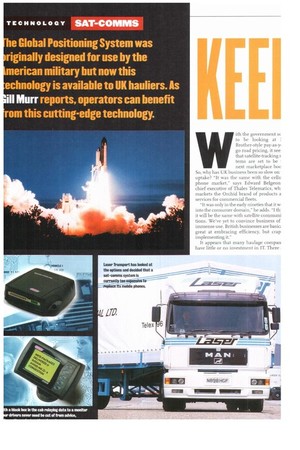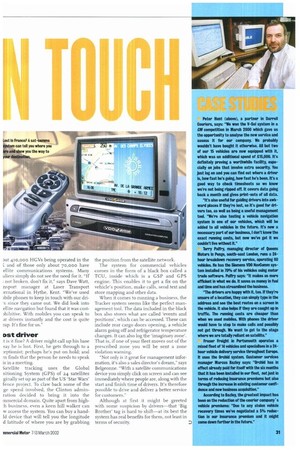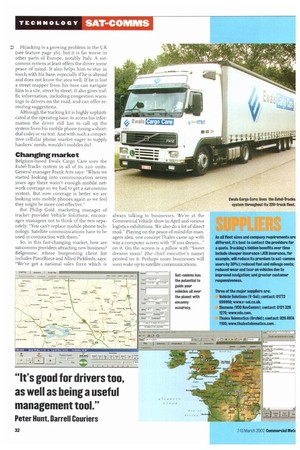W ith the government sc to be looking at 1 Brother-style
Page 30

Page 31

Page 32

If you've noticed an error in this article please click here to report it so we can fix it.
pay-as-y, go road pricing, it see that satellite-tracking s tems are set to be next marketplace boa So, why has UK business been so slow on uptake? It was the same with the cello phone market," says Edward Belgeon chief executive of Thales Telematics, wh markets the Orchid brand of products a services for commercial fleets.
It was only in the early nineties that it w into the consumer domain," he adds. "I th: it will be the same with satellite communi tions. We've yet to convince business of immense use. British businesses are basin great at embracing efficiency, but crap implementing it," It appears that many haulage compan have little or no investment in IT. There
311t 410,000 HGVs being operated in the and of those only about 70,000 have ellite communications systems. Many Liners simply do not see the need for it. "If not broken, don't fix it," says Dave Watt, nsport manager at Laser Transport :ernational in Hythe, Kent. "We've used >bile phones to keep in touch with our dri-s since they came out. We did look into ethic navigation but found that it was costihibitive. With mobiles you can speak to Jr drivers instantly and the cost is quite ,rap. It's fine for us."
Dst driver
is it fine? A driver might call up his base say he is lost. First, he gets through to a :eptionist; perhaps he's put on hold; and m finds that the person he needs to speak is in a meeting.
Satellite tracking uses the Global sitioning System f GPS) of 24 satellites ginally set up as part of the US 'Star Wars' fence project. To claw back some of the gospend involved, the Clinton adminration decided to bring it into the mrnercial domain. Quite apart from high;1-i business, even a keen hill walker can w access the system. You can buy a handld device that will tell you the longitude d latitude of where you are by grabbing
the position from the satellite network.
The system for commercial vehicles comes in the form of a black box called a TCU, inside which is a GSP and GPS engine. This enables it to get a fix on the vehicle's position, make calls, send text and store mapping and other data.
When it comes to running a business, the Tracker system seems like the perfect management tool. The data included in the black box also stores what are called 'events and positions', which can be accessed. These can include rear cargo doors opening, a vehicle alarm going off and refrigerator temperature changes. it can also log the 'imaginary zone'. That is, if one of your fleet moves out of the prescribed zone you will be sent a zone violation warning.
"Not only is it great for management information, it's also a sales director's dream," says Belgeonne. "With a satellite communications device you simply click on screen and can see immediately where people are, along with the start and finish time of drivers. It's therefore possible to drive and deliver a better service for customers."
Although at first it might be greeted with some suspicion by drivers—that 'Big Brother' tag is hard to shift—at its best the system has real benefits for them, not least in terms of security. Hijacking is a growing problem in the UK (see feature page 36), but it is far worse in other parts of Europe. notably Italy. A satcom ms system at least offers the driver some peace of mind. It also helps him to stay in touch with his base, especially if he is abroad and does not know the area well. If he is lost a street mapper from his base can navigate him to a site, street by street, It also gives traffic information, including congestion warnings to drivers on the road, and can offer rerouting suggestions.
Although the tracking kit is highly sophisticated at the operating base, to access his information the driver still has to call up the system from his mobile phone (using a shortdial code) or via text. And with such a competitive cellular phone market eager to supply hauliers' needs, wouldn't mobiles do?
Changing market
Belgium-based Ewals Cargo Care uses the Eutel-Tracks system in all of its 220 units. General manager Frank Arts says: "When we started looking into communication seven years ago there wasn't enough mobile network coverage so we had to get a sat-comms system. But now coverage is better we are looking into mobile phones again as we feel they might be more cost-effective."
But Philip Gold, marketing manager of tracker provider Vehicle Solutions, encourages managers not to think of the two separately: "You can't replace mobile phone technology. Satellite communications have to be used in conjunction with them."
So, in this fast-changing market, how are sat-comms providers attracting new business? Belgeonne, whose burgeoning client list includes Parcelforce and Allied Picicfords, says: "We've got a national sales force which is always talking to businesses. We're at the Commercial Vehicle show in April and various logistics exhibitions. We also do a lot of direct mail." Playing on the peace-of-mind-for-managers idea, one concept Thales came up with was a computer screen with "If you dream..." on it. On the screen is a pillow with "Sweet dreams xxxxx" (the chief executive's name) printed on it. Perhaps more businesses will soon wake up to satellite communications.
























































































































































